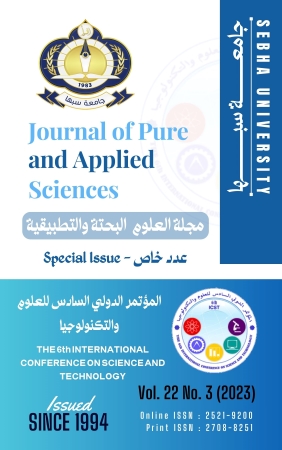Negative Effect Of Ponds Water On Environment
Abstract
This study assesses the rainwater ponds with comparison of water samples were taken back from the rainwater right after it fell. In addition, it will investigate the effect of negative effect of ponds rain water. After rainwater falling to the ground and being exposed to natural or industrial activities. This work examined this water Chemical, Physical and Biological properties. Field experiment was conducted in Misurata region in central Libya. The ponds rain water physicochemical parameters such as, acidic number (PH), Total dissolved salts (TDS), Electrical conductivity (E.C), Sulphates (So4-2), Nitrates (No3), Ca, Mn and Fe also determined. Fungal colonies were isolated and counted. The results reveal that sampling sites were affected by different activities waste. Total soluble salts of ponds rain water and control ranged from 24.6 to 524 ppm and the pH ranged from 7.1 to 8.4. and showed appreciable differences within localities. Electrical conductivity presented 39.0 to 819 ppm. Whereas the Sulphates, Nitrates showed 0 to 30 ppm,0 to 30.5 ppm respectively. The all tested metals increased from all locations. Isolated microbial flora consists of 4 fungal genera belonging to, Aspergillus, Penicillium, Rizopus and Fusarium. Most of them may consider the resistance fungi to industrial waste water due to its large colonies numbers isolated from unclean rainwater ponds water and contaminated metals area. In conclusion the human activities had a significant effect on all the parameters examined even microbial flora.
Full text article
Authors
Copyright (c) 2023 Journal of Pure & Applied Sciences

This work is licensed under a Creative Commons Attribution 4.0 International License.
In a brief statement, the rights relate to the publication and distribution of research published in the journal of the University of Sebha where authors who have published their articles in the journal of the university of Sebha should how they can use or distribute their articles. They reserve all their rights to the published works, such as (but not limited to) the following rights:
- Copyright and other property rights related to the article, such as patent rights.
- Research published in the journal of the University of Sebha and used in its future works, including lectures and books, the right to reproduce articles for their own purposes, and the right to self-archive their articles.
- The right to enter a separate article, or for a non-exclusive distribution of their article with an acknowledgment of its initial publication in the journal of Sebha University.
Privacy Statement The names and e-mail addresses entered on the Sabha University Journal site will be used for the aforementioned purposes only and for which they were used.

